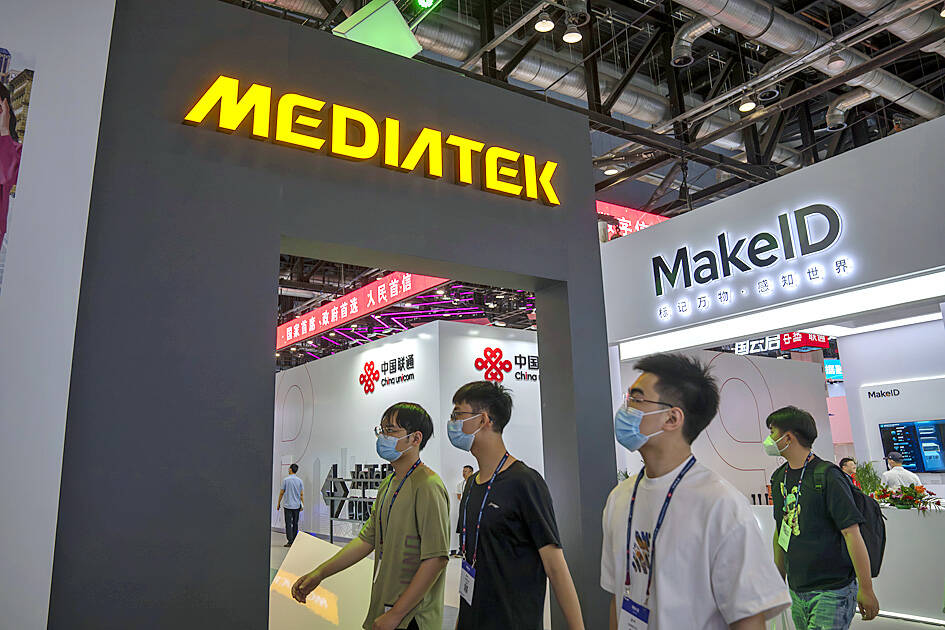MediaTek Inc (聯發科), the largest chip designer in Taiwan, yesterday denied a local media report that the company was partnering with Google to develop an artificial intelligence (AI) server chip and had received large orders from the US tech giant.
The company said in a regulatory filing that the report by the Chinese-language Economic Daily News was false and had been published on the basis of speculative information that had not been verified.
MediaTek said a false report such as the one in question could have an adverse effect on the company and investors, adding that it would resort to legal means to protect its interests if necessary.

Photo: AP
The report also said that MediaTek would collaborate with Taiwan Semiconductor Manufacturing Co (TSMC,台積電), the world’s largest contract chipmaker, to produce the AI server chips using its advanced 5-nanometer processes.
Citing industrial sources, the report said that as part of the partnership with Google, MediaTek would provide serializer/deserializer solutions to Google, which would help the US company enhance its tensor processing unit efforts to make the newest chips used in AI servers.
MediaTek is collaborating with other firms in AI development.
On May 30, it announced that it had partnered with California-based Nvidia Corp to develop technology for in-vehicle infotainment systems, with MediaTek CEO Rick Tsai (蔡力行) telling a news conference that the company would launch the automobile-related products in 2025.
By tapping into Nvidia’s core expertise in AI, the cloud, graphics technology and the software ecosystem, along with its advanced driver assistance systems, MediaTek would bolster the capabilities of its Dimensity Auto platform, the company has said.
Amid global inventory adjustments, MediaTek posted NT$16.87 billion (US$547.8 million) in net profit in the first quarter of this year, the lowest figure in nine quarters and down 8.7 percent from a year earlier, with earnings per share plummeting to NT$10.64 from NT$21.02.
The company’s consolidated sales last month decreased 39.38 percent to NT$31.57 billion from a year earlier, but the figure was up 11.35 percent from a month earlier.
During the April-to-May period, MediaTek’s aggregate consolidated sales stood at NT$59.92 billion.
Analysts have said the company needs to generate at least another NT$31.88 billion to reach its second-quarter target of NT$91.8 billion to NT$99.5 billion, which it announced at an investors’ conference in April.

Taiwan Semiconductor Manufacturing Co (TSMC, 台積電) would not produce its most advanced technologies in the US next year, Minister of Economic Affairs J.W. Kuo (郭智輝) said yesterday. Kuo made the comment during an appearance at the legislature, hours after the chipmaker announced that it would invest an additional US$100 billion to expand its manufacturing operations in the US. Asked by Taiwan People’s Party Legislator-at-large Chang Chi-kai (張啟楷) if TSMC would allow its most advanced technologies, the yet-to-be-released 2-nanometer and 1.6-nanometer processes, to go to the US in the near term, Kuo denied it. TSMC recently opened its first US factory, which produces 4-nanometer

GREAT SUCCESS: Republican Senator Todd Young expressed surprise at Trump’s comments and said he expects the administration to keep the program running US lawmakers who helped secure billions of dollars in subsidies for domestic semiconductor manufacturing rejected US President Donald Trump’s call to revoke the 2022 CHIPS and Science Act, signaling that any repeal effort in the US Congress would fall short. US Senate Minority Leader Chuck Schumer, who negotiated the law, on Wednesday said that Trump’s demand would fail, while a top Republican proponent, US Senator Todd Young, expressed surprise at the president’s comments and said he expects the administration to keep the program running. The CHIPS Act is “essential for America leading the world in tech, leading the world in AI [artificial

REACTIONS: While most analysts were positive about TSMC’s investment, one said the US expansion could disrupt the company’s supply-demand balance Taiwan Semiconductor Manufacturing Co’s (TSMC, 台積電) new US$100 billion investment in the US would exert a positive effect on the chipmaker’s revenue in the medium term on the back of booming artificial intelligence (AI) chip demand from US chip designers, an International Data Corp (IDC) analyst said yesterday. “This is good for TSMC in terms of business expansion, as its major clients for advanced chips are US chip designers,” IDC senior semiconductor research manager Galen Zeng (曾冠瑋) said by telephone yesterday. “Besides, those US companies all consider supply chain resilience a business imperative,” Zeng said. That meant local supply would

Servers that might contain artificial intelligence (AI)-powering Nvidia Corp chips shipped from the US to Singapore ended up in Malaysia, but their actual final destination remains a mystery, Singaporean Minister for Home Affairs and Law K Shanmugam said yesterday. The US is cracking down on exports of advanced semiconductors to China, seeking to retain a competitive edge over the technology. However, Bloomberg News reported in late January that US officials were probing whether Chinese AI firm DeepSeek (深度求索) bought advanced Nvidia semiconductors through third parties in Singapore, skirting Washington’s restrictions. Shanmugam said the route of the chips emerged in the course of an